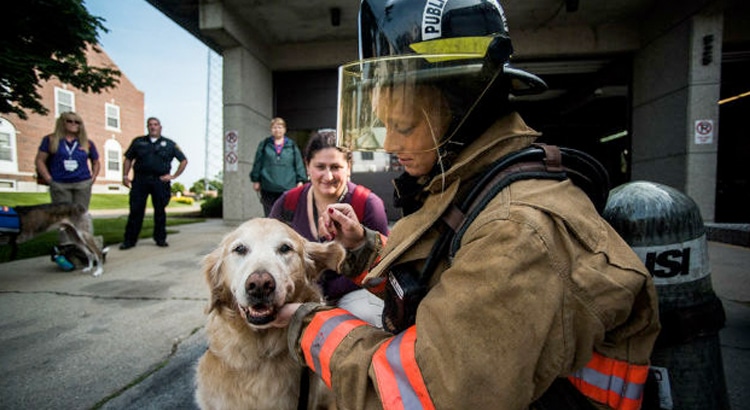
The National Crisis Response Canines have teamed up with Fire Station Two in St. Lucie County in Florida to learn the ropes around the station, becoming familiar with the trucks and specialized equipment. The purpose of this program is to create special trained dogs to provide safe, compassionate support to people affected by crisis. According to the National Crisis Response Canines website, the canines are specially training in psychological first aid and certified to work effectively in crisis environments with people experiencing intense emotions in the aftermath of a critical incident. This service is provided free of cost to individuals of any nationality, religion, ethnicity, race, legal status, political status, or sexual orientation.
Collaborative Efforts for Community Safety
Multi-agency coordination is the foundation of effective response and recovery. This program partners with neighborhoods to provide training programs such as CERT (Community Emergency Response Teams) neighborhood response drills, Medical Reserve Corps health campaigns, Emergency Management multi-agency disaster exercises, American Red Cross special needs shelter training, Home Depot Safety Days and much more.
Scope of Psychological Support
Examples of when specially trained dogs are beneficial for psychological support are not limited to home fire, domestic violence, child abuse, tragic death, school shooting, natural disaster, missing elderly and victims of crimes.
Canis Major + Canis Minor Mentorship Program
To specifically describe the mentorship program at National Crisis Response Canines, the following information was pulled directly from their website. The program in place is called Canis Major + Canis Minor, pairing a canine team in-training with a National certified crisis response canine team. The Canis Major team commits to mentoring the Canis Minor team throughout the 12-month program. During their training, the Canis Minor teams learn to work in the complex physical environments of disaster and to safely interact with people experiencing intense emotions in the aftermath of crises. Canis Minor teams train in their own community as to better understand the critical needs and available resources form a local perspective. The Canis Minor shadows the Canis Major through a wide variety of preparedness activities, community events, socialization exercises, environmental and emotional simulations and handling practicums.
Certification and Standards
Upon completion, the program offers a certification to specially trained dogs who demonstrate competency in working in the complex physical and emotional environments of disaster, and in safely interacting with people and experiencing intense emotions in the aftermath of a crisis. The certification complies with ‘The National Standards for Animal Assisted Crisis Response’.
Expertise and Training of Canine Teams
National crisis response canine teams are certified in FEMA’s Incident Command System, NCTSN Psychological First Aid, CPR-AED, Standard First Aid and Canine First Aid.
“The sooner we get on scene, the more likely we can prevent that long-term dysfunction among people,” Connie Jantzen said. “We make sure that people are safe physically, but we also make sure they’re safe psychologically.”

